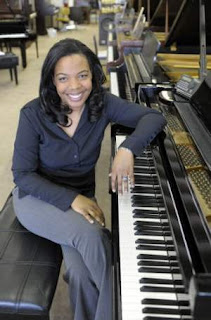How does a young classical pianist new to Asheville find a place in this area’s flourishing, some would say crowded, music scene?
For 29-year-old Kimberly Cann, who moved here two years ago, the answer might be, “Ask not what your community can do for you, ask what you can do for your community.”
With an impressive background that includes winning an important national competition at age 18 and a graduate degree from one of the nation’s top conservatories, the Eastman School of Music, Cann has been quietly making a name for herself by using her considerable musical talents to help local organizations.
“It was not my intention to be at the forefront of musical performance in Asheville,” Cann said with a laugh. “I wasn’t sure where I wanted to make my little niche. I was careful to get to know the community.”
She played a solo recital in Asheville as a benefit for Habitat for Humanity at St. Mark’s Lutheran Church in 2009.
Then she dazzled the audience last September at an Asheville Area Piano Forum benefit at Diana Wortham Theatre. She and her younger sister, Michelle, a student at the Cleveland Institute of Music and herself a rising piano star, played Rachmaninoff’s famously difficult Suite No. 2 for Two Pianos to an enthusiastic crowd.
In December, Cann became volunteer music coordinator for the YMI Cultural Center and began planning an ambitious series of events with Darin Waters, a historian of Asheville’s African-American community.
She wants to highlight the contributions of African-Americans to classical music. One of her concert pieces — which she’ll play Sunday at a sold-out show at the Asheville Art Museum — is “Troubled Waters” by Margaret Allison Bonds, a pianist and composer who in 1933 was the first African-American to solo with Chicago Symphony.
‘Rich heritage’
“For this generation (of African-American classical musicians), I think it’s really important that more of us continue to do what we do,” she said. “We forget what a rich heritage we all have in this wonderful music.”
“For this generation (of African-American classical musicians), I think it’s really important that more of us continue to do what we do,” she said. “We forget what a rich heritage we all have in this wonderful music.”
In graduate school, Cann was encouraged to pursue a concert career. She performed a sold-out concert at the Bermuda Festival in 2006, which was hailed as a “triumphal return” to the island where her father was born and later was the musical director of the Bermuda Institute.
“I strongly considered going the route of international competitions,” she said, as a way to become known as a soloist. But “that takes 110 percent, eight to 12 hours of practice a day. Countless hours of music have to be at the tips of your fingers.”
Did she have to choose between a performing career and a teaching career?
“I am going to try to do it all,” Cann said with another laugh. “I cannot devote my life to full-time performance, I cannot devote my life to full-time teaching.”
For now Cann teaches 25 students from her studio in Weaverville and is ramping up her local visibility as a performer. In addition to Sunday’s concert at the museum, she’ll play dates in April and an August concert at the Diana Wortham with her sister.
‘A world-class pianist’
As a newcomer to Asheville’s music scene, Cann had a head start. She spent part of her childhood in Fletcher, where her father was music director for Fletcher Academy. She attended the academy’s Captain Gilmer Elementary School until the family moved to Florida when she was 13.
As a newcomer to Asheville’s music scene, Cann had a head start. She spent part of her childhood in Fletcher, where her father was music director for Fletcher Academy. She attended the academy’s Captain Gilmer Elementary School until the family moved to Florida when she was 13.
She then returned for three summers to study at the Brevard Music Center.
After graduate school and a teaching and performing gig at Northern Caribbean University in Jamaica, Cann decided to settle in Western North Carolina. “I’ve done a lot of world traveling,” she said, “and this is one of the best places in the world.”
Polly Feitzinger, one of the founders of what began as the Asheville Piano Teachers Forum, first heard Cann play as an 11-year-old.
“She was a star student and an amazing child prodigy,” Feitzinger said. “I will never forget her performance of the famous Rachmaninoff prelude in C-sharp minor. She had the understanding and incredible musicality to play this work, which usually is not taught to students who are that age.”
Feitzinger was delighted to discover that Cann had moved back to Western North Carolina. “She is a world-class pianist,” she said.
Bill Clark, co-president of the Piano Forum, invited Cann to play last fall’s benefit before he had heard her, something he doesn’t like to do with a new pianist. Based on Feitzinger’s recommendation, he took what he calls “a calculated risk.”
He was sitting at the rehearsal in front of Feitzinger.
“After the first movement, I looked back at Polly with a huge smile on my face,” he said. “I could not believe what I was hearing. They just nailed it. They were really inside the music. They understood the architecture of it, in addition to having fabulous technique.”
As the closing number of the concert, Clark says, the Cann sisters had the audience members on their feet. “It was extremely exciting,” he said.
Asheville writer Arnold Wengrow is a contributing editor of Theatre Design and Technology magazine.

